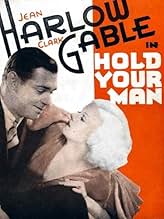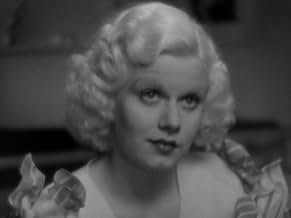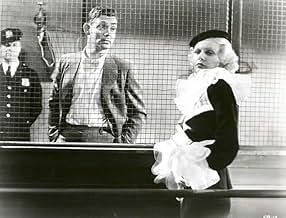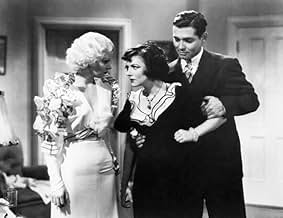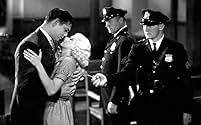A woman is sent to a reformatory when her con artist lover flees after killing a man during a botched blackmail scheme.A woman is sent to a reformatory when her con artist lover flees after killing a man during a botched blackmail scheme.A woman is sent to a reformatory when her con artist lover flees after killing a man during a botched blackmail scheme.
- Awards
- 2 wins total
Louise Beavers
- Elite Club Attendant
- (uncredited)
Wade Boteler
- Police Sergeant at Reformatory
- (uncredited)
Bobby Caldwell
- Ruby & Eddie's Son
- (uncredited)
Nora Cecil
- Miss Campbell
- (uncredited)
Jack Cheatham
- Policeman
- (uncredited)
G. Pat Collins
- Phil Dunn
- (uncredited)
Nell Craig
- Miss Willard - Reformatory Matron
- (uncredited)
Featured reviews
One of the great mysteries of life, suffered from daily, is why nice girls so often are more interested in the jerks and heels than in the nice guys.
Worse, when the nice guys even want to marry those girls, the girls STILL prefer the jerks and heels, even after the jerks and heels have shown their contempt, have shown they're just interested in using the girls.
Stu Erwin is the nice guy, who continues to be nice after being lied to and cheated and even after losing the girl completely.
Clark Gable is the jerk, and he is perfect in the role, rather a sad note to his fans.
Jean Harlow comes across as a more slender Mae West, even sounding like La West in some of her cynical throwaway lines.
Somewhat puzzling is that so many of the other characters, intended to be bad guys -- I mean, heck, they're locked up, so they must be -- are so obviously nice people.
In fact, there are lots of nice people here, people who, in a lesser film or story, would be snarling and back-stabbing but here go out of their way to help someone else.
So, maybe the story is rather clichéd, at least by modern standards, but ultimately the viewer will be glad to have watched.
The biggest complaint I have is that so many really good actors are not given credit. Once again, we can say a fervent "Thank You" to IMDb.com.
Worse, when the nice guys even want to marry those girls, the girls STILL prefer the jerks and heels, even after the jerks and heels have shown their contempt, have shown they're just interested in using the girls.
Stu Erwin is the nice guy, who continues to be nice after being lied to and cheated and even after losing the girl completely.
Clark Gable is the jerk, and he is perfect in the role, rather a sad note to his fans.
Jean Harlow comes across as a more slender Mae West, even sounding like La West in some of her cynical throwaway lines.
Somewhat puzzling is that so many of the other characters, intended to be bad guys -- I mean, heck, they're locked up, so they must be -- are so obviously nice people.
In fact, there are lots of nice people here, people who, in a lesser film or story, would be snarling and back-stabbing but here go out of their way to help someone else.
So, maybe the story is rather clichéd, at least by modern standards, but ultimately the viewer will be glad to have watched.
The biggest complaint I have is that so many really good actors are not given credit. Once again, we can say a fervent "Thank You" to IMDb.com.
Hold Your Man (1933)
*** (out of 4)
MGM tearjerker has a couple con artists (Jean Harlow, Clark Gable) falling in love but after an accidental murder they're separated. Gable takes off and Harlow ends up in a reform school where she learns she's pregnant but fears that she'll never see her man again. I really wasn't sure where this thing was going as it blends a strange mix of comedy with drama but in the end I found it quite touching. The first half plays as a comedy and gets a lot of laughs including a hilarious scene where Gable tries hiding from the police by getting in a tub and putting soap all over himself. There are plenty of pre-code moments mixed in with most of them coming from Harlow showing off various limbs. Gable is as good as always but it's Harlow who really steals the show. This is the first time I've seen her take on a dramatic role and she nails it perfectly. She's given several emotional scenes and she comes off very well. The ending is very dramatic and contains a beautiful message that comes across very well. It's also worth noting that there's a black preacher in the film and I think this is the nicest role I've seen a black actor play in this era of Hollywood. The stereotypes we normally see in this type of film are thrown out the window and this must have been one of the earliest films to show a black man in such a nice form.
*** (out of 4)
MGM tearjerker has a couple con artists (Jean Harlow, Clark Gable) falling in love but after an accidental murder they're separated. Gable takes off and Harlow ends up in a reform school where she learns she's pregnant but fears that she'll never see her man again. I really wasn't sure where this thing was going as it blends a strange mix of comedy with drama but in the end I found it quite touching. The first half plays as a comedy and gets a lot of laughs including a hilarious scene where Gable tries hiding from the police by getting in a tub and putting soap all over himself. There are plenty of pre-code moments mixed in with most of them coming from Harlow showing off various limbs. Gable is as good as always but it's Harlow who really steals the show. This is the first time I've seen her take on a dramatic role and she nails it perfectly. She's given several emotional scenes and she comes off very well. The ending is very dramatic and contains a beautiful message that comes across very well. It's also worth noting that there's a black preacher in the film and I think this is the nicest role I've seen a black actor play in this era of Hollywood. The stereotypes we normally see in this type of film are thrown out the window and this must have been one of the earliest films to show a black man in such a nice form.
Clark Gable plays a con man who busts into the life of hard-boiled dame Jean Harlow. He tries to sucker her while she brushes him off with her tough-gal attitude. Despite their cynicism and cons they fall in love. When Gable accidentally kills a man during a sting he runs out leaving loyal Harlow to women's prison where she discovers she's pregnant. Anita Loos' and Howard Emmett Rogers' writing is excellent throughout with many well-drawn and surprising characters (including a Jewish socialist woman inmate and a black woman inmate and her preacher father played with hardly a trace of stereotype). Gable and Harlow show their mettle as actors adding telling nuances and quirks to their characters that send them beyond the typical Gable and Harlow roles. And the direction is much better than you'd expect from Sam Wood. One beautiful shot has Harlow being inducted into the prison, then led out into a surprisingly snowy courtyard as the camera tracks after her. This is one of the best of both the "criminals in love" and "women's prison" genres and has some of the best hard-boiled dialogue ever written.
Love conquers all. That includes reality as defined in this pre-Code tearjerker. I would sympathize with the moral if the end weren't exaggerated into such a pile of mush. As others point out, the first half is sprightly as Gable and Harlow work the shady side of life. But then Gable accidentally kills a guy, while Harlow gets nabbed for a con job. So it's off to the hoosegow for both. Actually Gable drops out, while we follow Harlow's jaunt in a military- type slammer for women. Babes behind bars it ain't. The girls get to wear shapeless smocks, presided over by a bunch of long black crows (Patterson, et al.). One thing this segment proves—women can march from here to there in lockstep as well as men.
Some pre-Code highlights—Harlow in a gown unruffled by underwear; an actual socialist loudly denouncing the "system"; an unmarried Harlow with-child after an undisguised night with Gable; a peek-a-boo with Harlow in the bathtub. And though it's not pre-Code, the black minister and his inmate daughter rise above stereotype of the day. In fact, Theresa Harris is so winning as daughter Lillie Mae, she nearly steals the show. I can see why she had such a long career, even if mainly as menials.
The movie's a good look at MGM's golden twosome in their prime. And if the material falters, the stars manage to shine. So fans should be happy, despite the soggy ending.
Some pre-Code highlights—Harlow in a gown unruffled by underwear; an actual socialist loudly denouncing the "system"; an unmarried Harlow with-child after an undisguised night with Gable; a peek-a-boo with Harlow in the bathtub. And though it's not pre-Code, the black minister and his inmate daughter rise above stereotype of the day. In fact, Theresa Harris is so winning as daughter Lillie Mae, she nearly steals the show. I can see why she had such a long career, even if mainly as menials.
The movie's a good look at MGM's golden twosome in their prime. And if the material falters, the stars manage to shine. So fans should be happy, despite the soggy ending.
This pre-Code box office success pairs Clark Gable with Jean Harlow. Gable plays Eddie, a purveyor of the short con who, after taking advantage of his mark (or his women) quickly moves on. Harlow is Ruby, a platinum blond with common tastes who gets around and knows how to handle herself. She's the wiser of the two and she knows the odds are stacked against Eddie due to his criminal myopia.
After Eddie does a stint in jail, their relationship changes, but the consequences of past crimes derail the couple. Some reviewers have said that the film changes tone at this point and suffers from the change in focus. But this is when the viewer realizes this is Ruby's story. Eddie is the one who goes through the greatest transformation, but the tale is told from Ruby's point of view and we follow her ordeals.
Fortunately, Ms. Harlow is up to the challenge, delivering a touching performance that is multi-dimensional and deeply touching.
After Eddie does a stint in jail, their relationship changes, but the consequences of past crimes derail the couple. Some reviewers have said that the film changes tone at this point and suffers from the change in focus. But this is when the viewer realizes this is Ruby's story. Eddie is the one who goes through the greatest transformation, but the tale is told from Ruby's point of view and we follow her ordeals.
Fortunately, Ms. Harlow is up to the challenge, delivering a touching performance that is multi-dimensional and deeply touching.
Did you know
- TriviaWhen Eddie is looking around Ruby's apartment, waiting for his clothes to dry, he spots a pennant on the wall that says "Albany Night Boat." That refers to the steamships that would depart New York City in the early evening for an overnight trip up the Hudson River to Albany. The ships had hundreds of staterooms and often were used---as the film's contemporary audience would know---for romantic getaways or illicit affairs. The pillow Eddie sees next also may have been a souvenir from the ship, as it's inscribed, "We're here to-day/To-morrow we're through/So let's be gay/It is up to you." Such trips peaked in the early 20th century, but started to decline in the 1930s when less costly, speedier, and more efficient modes of transportation by rail and automobile came to the fore. By the 1940s, the Albany Night Boat had virtually ceased to exist.
- GoofsWhen Eddie slams the door after tossing Aubrey Mitchell out of the apartment, the wall shakes.
- ConnectionsFeatured in Mademoiselle Volcan (1933)
- SoundtracksHold Your Man
(1933) (uncredited)
Music by Nacio Herb Brown
Lyrics by Arthur Freed
Played on a record and sung by Harriet Lee
Reprised by Jean Harlow, playing piano and singing
- How long is Hold Your Man?Powered by Alexa
Details
Box office
- Budget
- $266,000 (estimated)
- Runtime
- 1h 27m(87 min)
- Color
- Aspect ratio
- 1.37 : 1
Contribute to this page
Suggest an edit or add missing content


